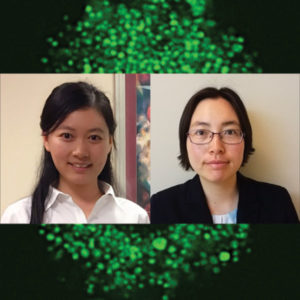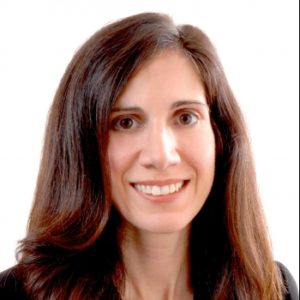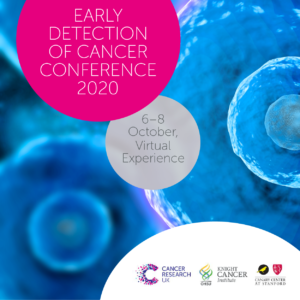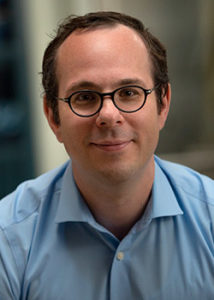
Stanford Molecular Imaging Scholars (SMIS) Program Quarterly Seminar
Zoom meeting: https://stanford.zoom.us/j/99117388314?pwd=R29OSjlTdUt0a3pLaG5Zc1BFNTJIUT09
Password: 922183
Guolan Lu, PhD
Mentor: Eben Rosenthal, MD; Garry Nolan, PhD
“Co-administered Antibody Improves the Penetration of Antibody-Dye Conjugates into Human Cancers: Implications for AntibodyDrug Conjugates”
Dianna Jeong, PhD
Mentors: Craig Levin, PhD; Shan Wang, PhD
“Novel Detection Approaches for Achieving Ultra-fast time resolution for PET”

Location & Timing
August 5, 2020
8:30am-4:30pm
Livestream: details to come
This event is free and open to all!
Registration and Event details
Overview
Advancements of machine learning and artificial intelligence into all areas of medicine are now a reality and they hold the potential to transform healthcare and open up a world of incredible promise for everyone. Sponsored by the Stanford Center for Artificial Intelligence in Medicine and Imaging, the 2020 AIMI Symposium is a virtual conference convening experts from Stanford and beyond to advance the field of AI in medicine and imaging. This conference will cover everything from a survey of the latest machine learning approaches, many use cases in depth, unique metrics to healthcare, important challenges and pitfalls, and best practices for designing building and evaluating machine learning in healthcare applications.
Our goal is to make the best science accessible to a broad audience of academic, clinical, and industry attendees. Through the AIMI Symposium we hope to address gaps and barriers in the field and catalyze more evidence-based solutions to improve health for all.

PHIND Seminar Series: Identifying Fibroblasts Subtypes Contributing to the Progression of Preinvasive to Invasive Lung Adenocarcinoma
Sylvia Plevritis, Ph.D.
Professor of Biomedical Data Science and of Radiology
Integrative Biomedical Imaging Informatics at Stanford
Stanford University
Location
Webinar URL: https://stanford.zoom.us/s/93945120934?pwd=a29GNjFCUzBtWjRsbFdnUnVUOTMzUT09
Dial: +1 650 724 9799 or +1 833 302 1536
Webinar ID: 939 4512 0934
Password: 767148
11:00am – 12:00pm Seminar & Discussion
RSVP: https://www.onlineregistrationcenter.com/SPlevritis
ABOUT
Dr. Sylvia K. Plevritis is Professor and Chair of Biomedical Data Science, Professor of Radiology at Stanford University and Program Director of the Stanford Biomedical Informatics Graduate Training Program. Dr. Plevritis leads a computational biology cancer research program that bridges genomics, imaging and population sciences to decipher properties of cancer progression and treatment response. Dr. Plevritis received her Ph.D. in Electrical Engineering and M.S. in Health Services Research, both from Stanford University, with a focus on cancer imaging physics and modeling cancer outcomes, respectively. She has had a primary authorship role on over 100 scientific cancer-related articles. She is a fellow of the American Institute for Medical and Biological Engineering (AIMBE) and Distinguished Investigator in the Academy of Radiology Research. She serves on the NCI Board of Scientific Advisors, the Program Leadership Committee of the Stanford Cancer Institute and the Leadership Council of the Stanford Bio-X Program. Dr. Plevritis has served on numerous NIH study sections, chaired scientific programs for the several professional societies including the American Association for Cancer Research (AACR) and presented keynote lectures across multiple scales of computational cancer biology. Currently, she is the Program Director of the Stanford Center in Cancer Systems Biology (CCSB) and has been a Principal Investigator with the NCI Cancer Intervention Surveillance Network (CISNET) for over fifteen years. She has served as Program Director of the Stanford Cancer Systems Biology Scholars Program (CSBS), and co-Division Chief of Integrative Biomedical Imaging Informatics at Stanford (IBIIS).
Sponsored by the PHIND Center and the Department of Radiology

Dear WMIS trainees, colleagues and friends,
We welcome you to join our upcoming virtual WMIS – Stanford Diversity conference on September 9-11, 2020. We are coming together to reinforce our commitment to diversity and to provide a forum for our team members to engage in meaningful discussions. The conference will provide keynote lectures, scientific presentations and educational lectures from leaders and pioneers in the field, who will discuss important topics related to racial justice, women in STEM and Global Health. We are also offering breakout sessions whereby carefully selected individuals will facilitate a discussion about how to implement more supportive and inclusive practices into our daily professional and personal life. The breakout sessions are designed to enable active involvement of smaller groups where people feel safe to discuss current challenges in the STEM field and actionable solutions.
This conference is free of charge and will provide 9.5 CME credits. Abstracts of all conference presentations and a summary of discussion points and insights provided by all conference participants will be published in Molecular Imaging & Biology. The organizing committee will provide 10 trainee prizes in the form of free WMIS memberships to conference attendants for the 2021 WMIC in Miami.
Website: https://www.wmislive.org

PHIND Seminar Series: Maintaining Competitive Advantage through Intellectual Capital
Soody Tronson, M.S., J.D.
Founder
Presque
Location & Timing
11:00am – 12:00pm Seminar & Discussion
Webinar URL: https://stanford.zoom.us/s/98817009379?pwd=U21pYnpCTUlxY3U2TEh4RmhvMXpvQT09
Dial: +1 650 724 9799 or +1 833 302 1536
Webinar ID: 988 1700 9379
Password: 767148
RSVP: https://www.onlineregistrationcenter.com/STronson
ABSTRACT
Digital health has provided a range of solutions, including health and wellness-related management, machine learning algorithms for pattern recognition, AI for genetic analysis, AI-enhanced clinical decision making, and virtual doctors that use AI for patient intake triage. Intellectual property can play an important role in providing a competitive advantage in the digital health industry. We will explore opportunities and challenges for protecting digital health technologies during the program, including patent eligibility challenges and the use of trade secrets.
ABOUT SOODY TRONSON
Soody Tronson is Founding Managing Counsel at STLG Law Firm, counseling domestic and international clients in IP and technology transactions in a wide range of technologies. In 2016 she formed, Presque, a company developing a line of medical devices for mothers and infants.
Soody has over 25 years of operational experience in technology, business, management, and law in start-up and fortune 100 companies, including Schering Plough Pharmaceuticals, Hewlett-Packard Co., Avantec Vascular, and the law firms of HellerEhrman and Townsend and Townsend.
Soody serves in board and leadership capacities with several organizations including the Association of Women in Science STEM to Market national accelerator; Licensing Executives Society USA/Canada, California Lawyers Association, and the Palo Alto Area Bar Association. Soody is a Commissioner with the city of Menlo Park; and an active hands-on volunteer with several civic organizations including Defy Ventures, an entrepreneurship training program for currently and formerly incarcerated. Soody has instructed courses in IP, licensing, and entrepreneurship at the University of California, Stanford University and European institutions. She is the co-author of the book “Women Securing the Future with TIPPSS for IoT: Trust, Identity, Privacy, Protection, Safety, Security for the Internet of Things.”
Hosted by: Garry Gold, MD
Sponsored by the PHIND Center and the Department of Radiology

Judy Gichoya, MD
Assistant Professor
Emory University School of Medicine
Measuring Learning Gains in Man-Machine Assemblage When Augmenting Radiology Work with Artificial Intelligence
Abstract
The work setting of the future presents an opportunity for human-technology partnerships, where a harmonious connection between human-technology produces unprecedented productivity gains. A conundrum at this human-technology frontier remains – will humans be augmented by technology or will technology be augmented by humans? We present our work on overcoming the conundrum of human and machine as separate entities and instead, treats them as an assemblage. As groundwork for the harmonious human-technology connection, this assemblage needs to learn to fit synergistically. This learning is called assemblage learning and it will be important for Artificial Intelligence (AI) applications in health care, where diagnostic and treatment decisions augmented by AI will have a direct and significant impact on patient care and outcomes. We describe how learning can be shared between assemblages, such that collective swarms of connected assemblages can be created. Our work is to demonstrate a symbiotic learning assemblage, such that envisioned productivity gains from AI can be achieved without loss of human jobs.
Specifically, we are evaluating the following research questions: Q1: How to develop assemblages, such that human-technology partnerships produce a “good fit” for visually based cognition-oriented tasks in radiology? Q2: What level of training should pre-exist in the individual human (radiologist) and independent machine learning model for human-technology partnerships to thrive? Q3: Which aspects and to what extent does an assemblage learning approach lead to reduced errors, improved accuracy, faster turn-around times, reduced fatigue, improved self-efficacy, and resilience?
Zoom: https://stanford.zoom.us/j/93580829522?pwd=ZVAxTCtEdkEzMWxjSEQwdlp0eThlUT09

Cancer Research UK, OHSU Knight Cancer Institute and the Canary Center at Stanford, present the Early Detection of Cancer Conference series. The annual Conference brings together experts in early detection from multiple disciplines to share ground breaking research and progress in the field.
The Conference is part of a long-term commitment to invest in early detection research, to understand the biology behind early stage cancers, find new detection and screening methods, and enhance uptake and accuracy of screening.
The 2020 conference will take place October 6-8 virtually.
Cancer Research UK, OHSU Knight Cancer Institute and the Canary Center at Stanford, have been closely monitoring developments relating to the coronavirus (COVID-19) outbreak and reviewing guidance from government bodies. After careful consideration, we have made the decision to convert the Early Detection of Cancer Conference 2020 to a virtual conference, instead of the scheduled in-person conference on October 6-8 in London, UK.
For more information visit the website: http://earlydetectionresearch.com/

Join us for the 3rd Annual Diversity and Inclusion Forum on Friday, October 9, 2020 on Zoom! This virtual event will highlight innovative workshops developed by our residents and fellows with their educational mentors who have participated in the 2019-2020 cohort of the Leadership Education in Advancing Diversity Program.
The event will be an enriching opportunity for all faculty, residents, fellows, postdocs, students, staff, and community members to learn tools and strategies to enable them to become effective change agents for diversity, equity, and inclusion in medical education.
All are welcome to participate and we look forward to seeing you on Friday, October 9!
Register here:
https://mailchi.mp/046c21726371/diversityforum2020-1632872?e=4a913cab2d

CEDSS: “The Origins and Detection of Lethal Prostate Cancer”
Paul Boutros, Ph.D., M.B.A.
Director, Cancer Data Sciences
UCLA
Please see zoom details below:
Meeting URL: https://stanford.zoom.us/s/93515779500
Dial: +1 650 724 9799 or +1 833 302 1536
Meeting ID: 935 1577 9500
Meeting Passcode: 767148
ABOUT
Boutros earned his B.Sc. degree from the University of Waterloo in Chemistry in 2004, and his Ph.D. degree from the University of Toronto, Canada, in Medical Biophysics in 2008. At Toronto, he also earned an executive M.B.A. from the Rothman School of Management. In 2008, Boutros started his independent research career at the Ontario Institute for Cancer Research first as a fellow (2008–2010) and then as principal investigator (2010–2018). He moved to California to join the UCLA faculty in 2018.
Hosted by: Utkan Demirci, Ph.D.
Sponsored by the Canary Center & the Department of Radiology
Stanford University – School of Medicine

In honor of the 30th anniversary of the Americans with Disabilities Act and October as National Disability Employment Awareness Month, join the Stanford Medicine Abilities Coalition (SMAC) for a first of its kind StanfordMed LIVE event focused on disability. Now more than ever during the COVID-19 pandemic, disabilities, health conditions, and illness impact not only our patients but also all of us, both personally and as members of the Stanford Medicine community. Stanford Medicine leadership will share information, answer questions, and engage in a roundtable discussion about the state of disability at Stanford and how best to support faculty, staff, and students living with disability and chronic illness. We encourage our community to submit questions and comments here to be shared broadly with the Stanford Medicine community. The same link can be used to request any accommodations needed for the livestream. Additional information for the webcast itself will be sent out closer to the event.
Livestream link: https://livestream.com/accounts/1973198/events/9288854